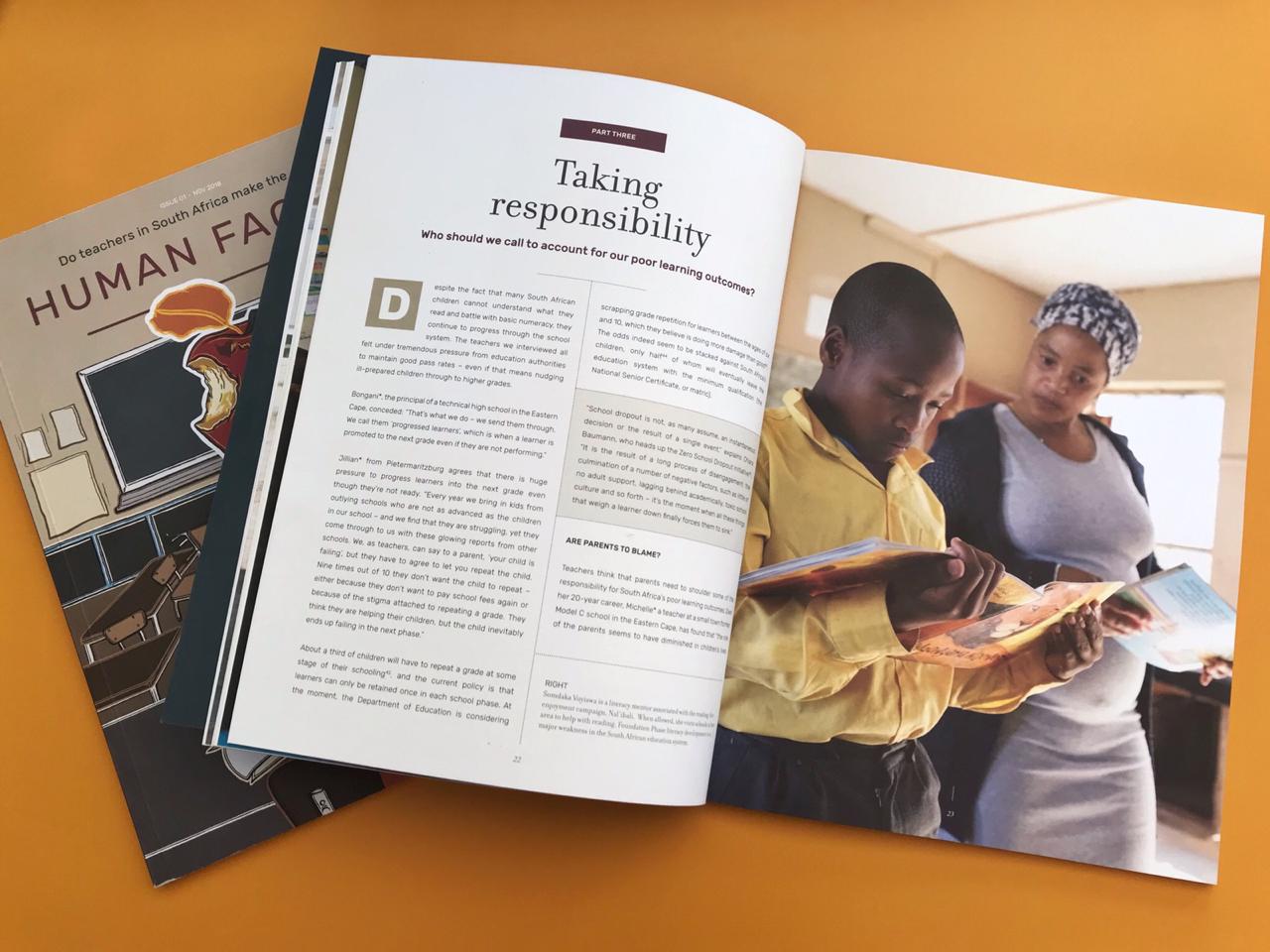Ultimately, there are only two ways to improve the world – through technology and through behaviour change. The DG Murray Trust’s new publication, the Human Factor, focuses on the latter. “Far too often people are viewed as the ‘problem’ in development; through the lens of
the Human Factor, we see them as development’s greatest asset,” explains DGMT CEO, David Harrison.
 As part of DGMT’s vision for South Africa where every person is able to fulfill their potential,
As part of DGMT’s vision for South Africa where every person is able to fulfill their potential,
the Human Factor explores key challenges that have stalled our progress as a nation – and the
opportunities we can leverage to turn this situation around.
Through a collection of investigative and analysis pieces, images, essays and infographics, the
launch edition of the Human Factor begins by looking at South Africa’s education system from
the perspective of teachers – taking readers on a journey into some of the country’s most
impoverished classrooms to see what it’s really like to be a teacher in SA today.
“Imagine the potential influence of the 400 000 teachers across South Africa in shaping the
country’s future,” says Harrison. “Apart from parents, what more powerful multipliers of
goodness and hope? What more profound agents of change? Yet, as the stories in the Human
Factor reveal, many teachers feel demoralised and unsupported.”
From the pressure of getting through a curriculum that is too full, to teaching subjects they are not trained in; from two schools in the rural Eastern Cape – one successfully managing to improve its matric pass rate, the other still battling to do so – to the strength of the Zimbabwean education system that has managed to weather political and economic collapse,the Human Factor captures the insights of a number of teachers, principals and
educationalists to better understand our schooling system, and where we’ve gone wrong.
But, rather than offer a neat set of takeaways or convenient roadmaps to change, the publication aims to do something different: “Our hope is to cultivate a space where we can look at our teachers and the education system with less judgment and more compassion, less blame and more broad-mindedness; to draw out insight and inspiration from a wide range of people – including some who never thought they had a contribution to make,” shares Harrison.
And to ensure the Human Factor offers nuanced insight, each issue is developed under the guidance and direction of a guest editorial board, made up of people who represent different perspectives on the theme at hand.  The Editorial Board for the launch edition, ‘Do teachers inSouth Africa make the grade?’, comprised: Wisizwi Billie, principal of one of the biggest
The Editorial Board for the launch edition, ‘Do teachers inSouth Africa make the grade?’, comprised: Wisizwi Billie, principal of one of the biggest
schools in the Eastern Cape, with 3 800 learners; Nonkosikhona Moshani, an Eastern Cape learner who matriculated in 2017; independent education consultant Lynn van der Elst; who has been instrumental in initiating the newly established EdHub, an innovation centre serving the country’s basic education sector; as well as Associate Professor Ursula Hoadley, who is based at the School of Education at the University of Cape Town, and recently authored ‘Pedagogy in poverty: Lessons from 20 years of curriculum reform in South Africa’.The launch edition was guest edited by journalist and editor Natasha Joseph.
“Too often, the stories we read in the press about South Africa’s education system, and especially its teachers, are presented in binary terms: teachers are always the villain or the victim. As a journalist and an editor, having the chance to present a more nuanced, human – and humane – view of the country’s educators was a real privilege; being able to take the time to really delve into teachers’ lives and stories allowed us to tell a more balanced story and to hear the people who may hold many of the solutions to our schools’ problems,” says Joseph.
The Human Factor will be distributed within civil society and the education sector. An electronic copy can be downloaded from DGMT’s website and a number of printed copies will be distributed on request (please write to communications@dgmt.co.za to request a copy).DGMT is a South African foundation committed to developing South Africa’spotential through public innovation and strategic investment. Our goal for South Africa is a flourishing people, economy and society (www.dgmt.co.za).
- MRF Unveils Latest MAPS® Data - 20th February 2025
- The BRC announces changes to the board and updates for 2025 - 17th December 2024
- Top 50 DSTV TV programmes – October 2024 - 12th November 2024





